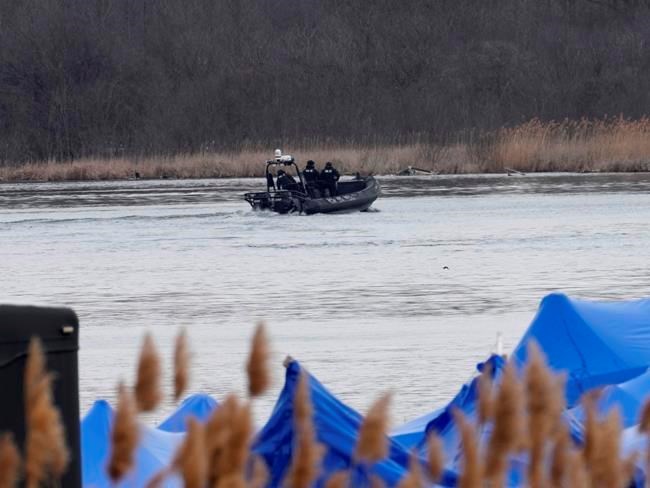QUEBEC — Authorities in the Mohawk Territory of Akwesasne lamented on Friday how their community is often exploited by human trafficking networks after the bodies of eight migrants, including two children, were pulled from the St. Lawrence River.
Police on Thursday found the bodies of five adults and one child — members of two families of Romanian and Indian descent — in a marshy area of the St. Lawrence River in Akwesasne, which straddles the Canada-U.S. border. Parts of the territory are in Ontario, Quebec and New York state.
The next day, police found the body of a second child — a Canadian citizen and a member of the Romanian family — and the body of an adult woman believed to be an Indian national, Akwesasne Mohawk Police Chief Shawn Dulude told reporters. He said he didn't think there were any more bodies in the water.
Dulude said Akwesasne's unique geography makes it fertile ground for human smugglers. Since January, he said, his police force has made 48 separate interceptions involving 80 people trying to enter the United States illegally. Most of them have been of Indian or Romanian descent.¬Ý
"There are people of our community who are vulnerable … usually younger people who are looking to make money, and they are exploited .... in the present case we're talking about human smuggling."
He said criminal networks know they can "facilitate and find people in our community, that are to a certain extent exploited because of their knowledge of the waters and the lay of the land — that they can get people into the United States."
Dulude, however, said he couldn't make any direct connections between the deaths of the eight migrants and a missing 30-year-old Akwesasne resident, Casey Oakes, who was last seen Wednesday night operating a boat that was found Thursday next to the bodies of the migrants.
It was the search for Oakes that led police to find the bodies on Thursday.
"At the present time we don't know," he said about whether Oakes was transporting the migrants in the boat. "We are searching for him."
The 30-year-old was charged last year with two criminal counts: dangerous operation of a conveyance and assault with a weapon. He is due back in court in Valleyfield, Que., at the end of May for the case, which was investigated by the Akwesasne police.¬Ý
Dulude said his police service received two calls on Wednesday night around 9:30 p.m. from people who said there was "shouting out in the vicinity of the river." He said his officers patrolled the shoreline using night-vision goggles and body-heat sensors.¬Ý
"They were not able to see any heat or movement on the water," he said.
On Friday afternoon, search and rescue boats could be seen slowly cruising the marshy banks of the islands within the river, as chunks of ice occasionally floated past. Tony Jackson, a 31-year-old Akwesasne resident, was tending a bonfire next to the river, where he and two friends watched a police helicopter make slow passes over the shoreline.¬Ý
Jackson said he went to school with Oakes and the two played sports together.¬Ý
‚ÄúIt‚Äôs a small community, so we all knew each other,‚Äù he said.¬Ý
Jackson said boating in Akwesasne is a way of life, and that many people regularly use boats to go from the Canadian to the U.S. side of the community. He said the weather on Wednesday, when Oakes was last seen, was calm during the day but later turned rough.¬Ý
“The east wind around here creates a lot of waves, five feet tall, maybe taller,” said Jackson. He said he believed Oakes’s boat was less than six metres long.
Crossing the river on a little boat with many people on board, "that called for disaster,” he said.
While he never heard Oakes talk about transporting migrants, Jackson said he has personally witnessed groups of them crossing through fields with bags in hand, adding that he has also occasionally seen boats carrying large groups of people across the river. Once on the Quebec side of Akwesasne, he said, the border is not far by foot.
“A couple of times in one month, you’ll see a couple of them walking down the road with all their bags,” he said.
Mohawk police said they are working with Immigration Canada and the U.S. Department of Homeland Security to try to identify the victims and determine their status in Canada.
The territory is known for –°¿∂ ”∆µ a transit point for the trafficking of humans and contraband because of its location. And in February, police in Akwesasne reported an increase in human smuggling into the Mohawk territory.
In April 2022, six Indian nationals were rescued from a sinking boat in the St. Regis River, which runs through Akwesasne Mohawk Territory. A seventh person, spotted leaving the vessel and wading ashore, was later identified as a U.S. citizen. U.S. Customs and Border Protection officials described what happened as a human smuggling incident.
Abram Benedict, Grand Chief for the Mohawk Council of Akwesasne, said his community continues to be exploited by criminals who help people to cross into the U.S.
"The human trafficking element of this will likely continue for the foreseeable future," he told reporters.¬Ý
He said the fact the territory crosses two provincial boundaries and an international border "makes it extremely challenging for our police services ... so we'll continue to lobby both governments ‚Äî Canada and the United States ‚Äî to continue providing us the resources to make our community safe; so that these incidents don't happen again, so that we're not –°¿∂ ”∆µ exploited by organized crime."
This report by The Canadian Press was first published March 31, 2023.
Morgan Lowrie, The Canadian Press




